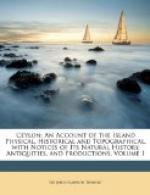Paleness.—At the same time it must be observed, that the pallid complexion peculiar to old residents, is not alone ascribable to an organic change in the skin from its being the medium of perpetual exudation, but in part to a deficiency of red globules in the blood, and mainly to a reduced vigour in the whole muscular apparatus, including the action of the heart, which imperfectly compensates by increased rapidity for diminution of power. It is remarkable how suddenly this sallowness disappears, and is succeeded by the warm tints of health, after a visit of a very few days to the plains of Neuera-ellia, or the picturesque coffee plantations in the hills that surround it.
Ladies.—Ladies, from their more regular and moderate habits, and their avoidance of exposure, might be expected to withstand the climate better than men; and to a certain extent the anticipation appears to be correct, but it by no means justifies the assumption of general immunity. Though less obnoxious to specific disease, debility and delicacy are the frequent results of habitual seclusion and avoidance of the solar light. These, added to more obvious causes of occasional illness, suggest the necessity of vigorous exertion and regular exercise as indispensable protectives.
If suitably clothed, and not injudiciously fed, children may remain in the island till eight or ten years of age, when anxiety is excited by the attenuation of the frame and the apparent absence of strength in proportion to development. These symptoms, the result of relaxed tone and defective nutrition, are to be remedied by change of climate either to the more lofty ranges of the mountains, or, more providently, to Europe.
Effects on Europeans already Diseased.—To persons already suffering from disease, the experiment of a residence in Ceylon is one of questionable propriety. Those of a scrofulous diathesis need not consider it hazardous, as experience does not show that in such there is any greater susceptibility to local or constitutional disorders, or that when these are present, there is greater difficulty in their removal.
To those threatened with consumption, the island may be supposed to offer some advantages in the equability of the temperature, and the comparative quiescence of the lungs from reduced necessity for respiratory effort. Besides, the choice of climates presented by Ceylon enables a patient, by the easy change of residence to a different altitude and temperature, avoiding the heats of one period and the dry winds of another, to check to a great extent the predisposing causes likely to lead to the development of tubercle. This, with attention to clothing and systematic exercise as preventives of active disease, may serve to restrain the further progress though it fail to eradicate the tendency to phthibis. But when already the formation of tubercle has taken place to any considerable extent, and is accompanied by softening, the morbid condition is not unlikely to advance with alarming celerity; and the only compensating circumstance is the diminution of apparent suffering, ascribable to general languor, and the absence of the bronchial irritation occasioned by cold humid air.




